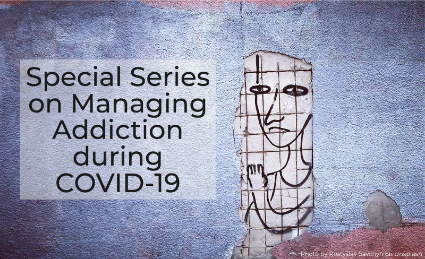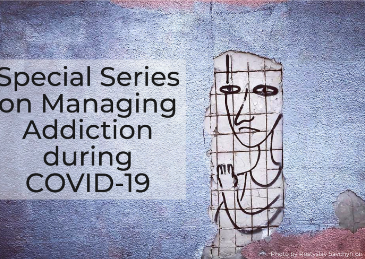 In the early days of the COVID-19 pandemic, we sounded the alarm that people with addiction might experience worsening problems or relapse because they would be cut off from social networks that are essential to staying healthy. Unfortunately, these fears were justified. Because of the need to physically distance, we have been spending less time with people outside our households (an average of an hour and a half less each day, among Americans) and more time alone. Isolation, combined with loss of income, lack of rewarding activities, and other pandemic-related stressors, have hit people with addiction hard.
In the early days of the COVID-19 pandemic, we sounded the alarm that people with addiction might experience worsening problems or relapse because they would be cut off from social networks that are essential to staying healthy. Unfortunately, these fears were justified. Because of the need to physically distance, we have been spending less time with people outside our households (an average of an hour and a half less each day, among Americans) and more time alone. Isolation, combined with loss of income, lack of rewarding activities, and other pandemic-related stressors, have hit people with addiction hard.
And as is often the case with public health emergencies, people from underserved and marginalized communities were disproportionately hurt. Black, Hispanic/Latinx, and Native American people were, and are, more likely to work in jobs that expose them to COVID-19 and other transmissible diseases. Compounding this, people from underserved communities often rely on underfunded health systems that had to close their clinics abruptly before they could set up alternative access points, which cut patients off from medical and social lifelines. People returning to their communities from incarceration or hospitalization had to find new ways to access healthcare services, often without safe means of transportation. So many of these problems were entirely predictable. We must learn from what’s happened over the past 18 months in order to lessen the burden on vulnerable people during the next public health emergency.
To that end, we’re dedicating this month to the topic of “Managing Addiction during COVID-19.” First, we’ll review a study that explored how people’s gambling habits changed around the world during the pandemic. Next, we’ll summarize a study that used data from 83 countries to examine how drinking habits changed. Turning to smoking, we’ll explore how the nationwide stay-at-home order affected Italians’ smoking habits. All three of these studies tell essentially the same story: the pandemic caused many people to gamble, drink, or smoke less, but it caused those who were especially vulnerable (because of their pandemic experiences, pre-existing mental health challenges, or other risk factors) to gamble, drink, or smoke more. In other words, the pandemic’s harm was unevenly distributed. Finally, we’ll review data showing how the pandemic caused excess deaths in the U.S. from five causes: drug overdoses, homicide, unintentional injuries, motor vehicle crashes, and suicide.
But alongside these disheartening trends were inspiring stories of individual resilience, and we’ll share some of these as well. Mr. Christopher Johnson, a Boston-area man who has experienced a substance use disorder, will describe how the pandemic affected his recovery journey. Mr. John McGahan, President/CEO of the Gavin Foundation, a Boston non-profit, will describe the steps his team took to ensure that people in recovery could maintain the vital connections they share with one another, whether through meetings held online or under the shelter of a 30 x 60 foot tent that they managed to heat and power through cold winter days. Dr. Randi Sokol, a physician at Cambridge Health Alliance who treats people with opioid use disorder, felt the same need to maintain social lifelines. She and her team learned how to adapt their group-based treatment for the online environment, including setting rules like “no driving while in group therapy.” Dr. Sokol’s op-ed will highlight how important socializing and accountability are to patients recovering from addiction. Ms. Khadi Oluwatoyin will then discuss her views on the drinking climate that developed once we went into quarantine and her motivation for creating the Sober Black Girls Club, a community that was recently profiled in Teen Vogue. Finally, Dr. Sasha Stark will review her own research exploring how emerging adults changed the way they gamble online during the pandemic. Dr. Stark and her colleagues uncovered concerning trends that demand targeted prevention and intervention approaches.
We’ve long known that addiction is a disease of isolation, but the pandemic gave us all a sense of what it really means to be isolated. It is our hope that by sharing scientific evidence and personal stories of people directly affected by addiction, we’ll help raise awareness and minimize harm from future public health emergencies.
This Special Series is generously sponsored by the Greater Boston Council on Alcoholism, whose mission is to increase public understanding of the nature, treatment, and prevention of alcohol and other drug use disorders. We thank the Greater Boston Council for making this Special Series possible.
— Heather M. Gray, Ph.D., Director of Academic Affairs, Division on Addiction at Cambridge Health Alliance, a Harvard Medical School teaching hospital; Instructor, Harvard Medical School
Conflict of Interest Statement
Dr. Gray has no conflicts of interest to disclose of personal, financial, or other benefits that could be seen as influencing the content of this editorial. The Division on Addiction’s funding sources can be found here.
What do you think? Please use the comment link below to provide feedback on this article.




